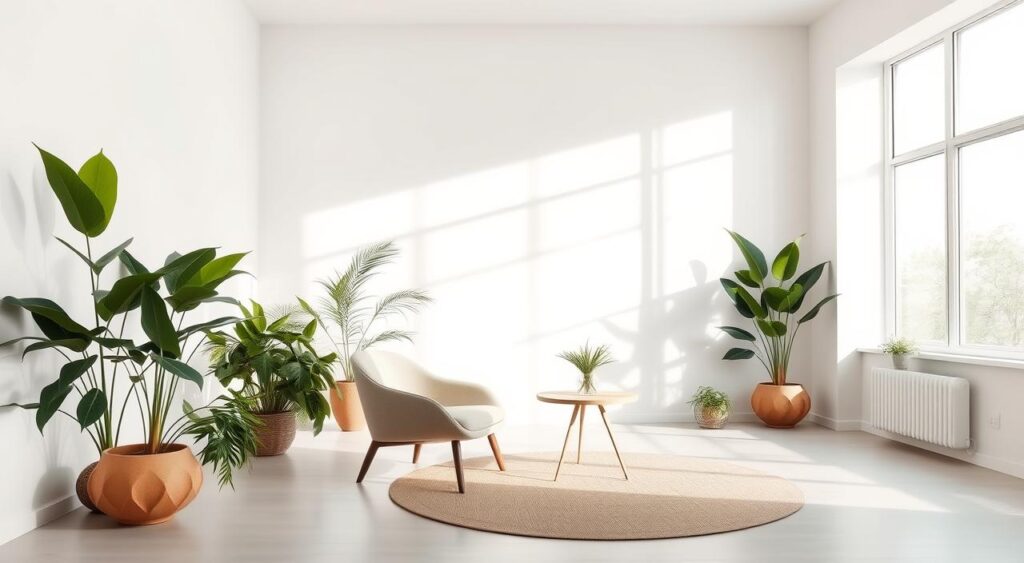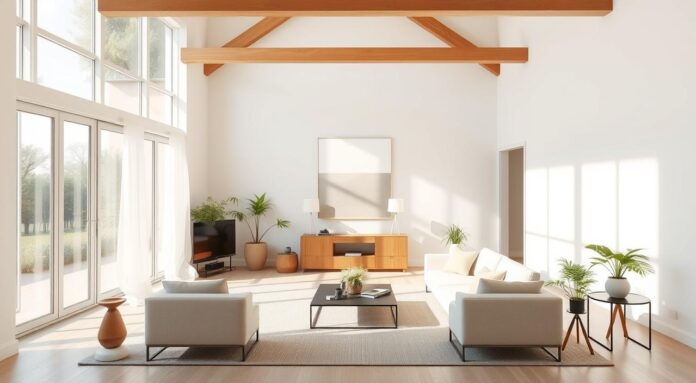Joshua Fields Millburn said, “The question of what you want to own is actually the question of how you want to live your life.” This really hit home for me. Living simply has made me healthier and happier. I’m excited to share how it changed my life.
We’ll dive into what minimalist living is and why it’s good. We’ll look at the science and share tips for living simply. I’ll also share my own journey with minimalism.
Key Takeaways
- Embracing a minimalist lifestyle can lead to a healthier, happier life
- Simple living can reduce stress and increase productivity
- A minimalist lifestyle can improve mental clarity and focus
- Adopting minimalist habits can lead to a more fulfilling life
- Minimalist living can have a positive impact on the environment
- A minimalist lifestyle can lead to significant cost savings
Understanding the Minimalist Mindset: A Scientific Perspective
Minimalist living is more than just getting rid of stuff. It’s about having a simple and clear mindset. Decluttering helps us focus better and think clearer. It makes our space calm and productive.
Our brains like simplicity. Clutter makes it hard to think straight. It’s because our brains are always working. Too much stuff makes it too much to handle.
By making our space simple, we feel better. We get less stressed and more focused. Here are some benefits:
- Improved mental clarity and focus
- Reduced stress and anxiety
- Increased productivity and efficiency
Minimalist living is more than just cleaning up. It’s a way to live simpler and more efficiently. It’s about valuing simplicity and clarity in our lives.
The Proven Connection Between Minimalism and Stress Reduction
Living a minimalist lifestyle can really help lower stress. It makes our homes peaceful and tidy. This calmness can make us feel less stressed and anxious.
Here are some ways a minimalist lifestyle helps with stress reduction:
- Less clutter means less stress
- A tidy home feels calm
- We focus on what matters, not stuff
By choosing a minimalist lifestyle, we see stress go down. We let go of things we don’t need. This makes life more balanced and happy.
Essential Healthy Living Tips for the Minimalist Lifestyle
Living simply has made me focus on healthy habits. I eat better, exercise mindfully, and keep my space clean. This has boosted my health and happiness.
Mindful exercise is key in a simple life. It means being fully in the moment while moving. Yoga, walking, and swimming are great examples. They help me feel less stressed and more energetic.
Simplifying Your Nutrition Choices
I cut out processed foods and eat whole foods now. This means more fruits, veggies, grains, and proteins. It’s helped me stay healthy and lower my risk of diseases.
Creating a Clutter-Free Wellness Space
A clean space is vital for feeling good. It helps me relax and feel calm. Here’s how to keep your space tidy:
- Remove things that distract you.
- Add plants and natural things.
- Use soft colors and textures.
By following these tips, I’ve gotten healthier and happier. It’s about making small changes and being mindful. With effort, you can too, and enjoy a better life.
| Healthy Living Tips | Benefits |
|---|---|
| Mindful Exercise | Reduces stress, increases energy |
| Simplifying Nutrition Choices | Improves overall health, reduces chronic disease risk |
| Clutter-Free Wellness Space | Reduces stress, increases relaxation |
How Minimalism Impacts Mental Health: Research Findings
Exploring minimalist living, I found a big link to better mental health. Studies show that minimalism can lower anxiety and boost mental clarity. Living without clutter can deeply affect our minds.
Minimalism focuses on simplicity and purpose. This helps people focus on what’s most important. It brings calm and control. Some mental health perks of minimalism are:
- Less stress and anxiety
- Better focus and clear thinking
- More self-awareness and thinking deeply
- Feeling more thankful and happy
Research shows that minimalists have better mental health. For example, a study in the Journal of Environmental Psychology found less stress and better thinking in clutter-free homes.
Looking into minimalism and mental health, I see lots of proof. By choosing simplicity, people can greatly improve their mental health. This leads to a more satisfying and meaningful life.
| Benefits of Minimalism | Impact on Mental Health |
|---|---|
| Reduced clutter and simplicity | Reduced stress and anxiety |
| Increased intentionality and focus | Improved mental clarity and self-awareness |
| Enhanced sense of gratitude and appreciation | Increased sense of well-being and life satisfaction |
The Physical Benefits of Living with Less
Living with less can make us feel better. It helps us sleep better and boosts our immune system. Our homes feel cleaner and air is fresher. This makes us healthier and happier.
Some big benefits of living simply include:
- Improved sleep patterns, which can lead to better rest and recovery
- Enhanced immune function, which can help to prevent illness and disease
- Better air quality and respiratory health, which can reduce the risk of respiratory problems
Living simply makes us feel more alive. We have more energy and think clearer. Every small change helps us feel better.

Creating a Healthy and Comfortable Living Space
To feel good, we need a clean and cozy home. We can do this by getting rid of clutter. Using natural stuff and adding plants helps too.
This makes our home peaceful. It helps us stay healthy and happy for a long time.
My Personal Journey to Minimalist Wellness
Starting my personal journey to minimalist wellness was tough. But the good stuff I got was worth it. Living simply helped me feel better inside and out. I’m here to tell you all about it.
Some big wins on my personal journey to minimalist wellness were:
- Less stress and worry
- Better sleep
- More energy
I made my home simpler by getting rid of stuff I didn’t need. This made my space calm and peaceful. I also started doing mindfulness and meditation. These helped me stay calm and focused.
My journey to minimalist wellness changed me a lot. It showed me the value of living simply and on purpose. I hope my story will motivate you to start your own minimalist wellness journey. You’ll see how good it feels.
Practical Steps to Begin Your Minimalist Transformation
To start your minimalist journey, take practical steps for a simpler life. Create a plan that fits you and helps you face challenges. Begin with one room at a time, then move to the whole house.
Building sustainable habits is key to a minimalist life. Start daily routines that keep things simple and clutter-free. Declutter one area at a time, donate or recycle what you don’t need, and follow the “one in, one out” rule.
Overcoming Obstacles
When you start a minimalist life, you might face common challenges. Stay focused on your goals and remember why you began. Look for inspiration, read about minimalism, and join online groups to stay motivated.
- Start with small, achievable goals
- Be patient and don’t get discouraged by setbacks
- Find a support system to help you stay on track
By following thesepractical stepsand creatingsustainable habits, you’ll overcomecommon challenges. You’ll live a more minimalist and fulfilling life.
The Environmental Impact of Minimalist Living
Exploring minimalist living shows me its big environmental impact. It helps us throw away less, save more, and live greener. This makes our lives better for the planet.
Minimalist living helps the earth in many ways. For example:
- Using less energy with efficient appliances and turning off things we don’t use
- Using less water by taking shorter showers and fixing leaks
- Throwing away less by avoiding plastics, composting, and recycling
These small steps can make a big difference. They help us live in a way that’s better for our planet. I’m excited to learn more about living simply and helping the earth.
In short, living simply is good for us and the planet. By choosing to live more simply, we help make the future brighter for our world.
Scientific Studies Supporting Minimalism’s Benefits
Exploring minimalist living, I find many studies backing its benefits. These studies highlight how minimalism boosts our mental clarity, physical health, and overall well-being.
Research on Mental Clarity
Studies show a clean space boosts our mental clarity. It helps us focus and make better choices. For example, a study in the Journal of Environmental Psychology found that a tidy workspace improves thinking and lowers stress.
Studies on Physical Health Improvements
Minimalism also improves our physical health. It helps us avoid toxins, sleep better, and move more. The National Sleep Foundation found that a clean bedroom leads to better sleep and health.
Some key findings from scientific studies on minimalism include:
- Improved mental clarity and reduced stress levels
- Enhanced physical health and well-being
- Increased productivity and focus
By living minimally, we can see these benefits ourselves. Decluttering, eating simpler, and reducing waste all show minimalism’s positive effects.
| Study | Findings |
|---|---|
| Journal of Environmental Psychology | Improved cognitive function and reduced stress levels in clutter-free environments |
| National Sleep Foundation | Improved sleep quality in clutter-free bedrooms |
Conclusion: Embracing the Science of Simple Living
The science of living simply is really interesting and powerful. It helps us feel better in our minds, bodies, and hearts. By getting rid of too much stuff, we can focus better, feel less stressed, and be healthier.
Starting to live simply might seem hard at first. But the good things you’ll get are worth it. Try to make small changes to live more simply. Start by cleaning one room or area that bothers you the most.
Living simply is not about giving up things. It’s about choosing what’s really important. By having only what you need, you make room for what truly makes you happy. Start living simply and find more joy, clarity, and happiness in your life.
FAQ
What are the cognitive benefits of living in a minimal environment?
Living simply can make your mind clearer and more focused. It helps your brain work better. This leads to being more productive and making better choices.
How can a minimalist lifestyle help reduce stress and anxiety?
Simple living can really cut down stress and anxiety. It makes your space calm and organized. This helps you feel more at peace and in control.
What are some tips for designing a clutter-free wellness space?
For a clean wellness space, add plants and use soft colors. Choose furniture that does more than one thing. Keep it simple and focus on calm.
How does minimalism impact physical health and sleep patterns?
Simple living can improve sleep and boost your immune system. It makes your home healthier. This supports your body’s well-being.
What are some practical steps to begin a minimalist transformation?
Begin with one area at a time. Make habits that help you live simply. Overcome attachment to things by finding new ways to see them.
How does minimalist living contribute to a more environmentally-friendly way of life?
Simple living uses less and wastes less. It’s good for the planet. Adding green habits like recycling helps even more.
What are some of the key scientific studies that support the benefits of minimalism?
Many studies show how simple living helps your mind and body. It makes you clearer, calmer, and healthier. It even helps you sleep better.


